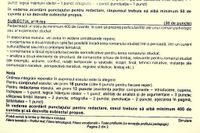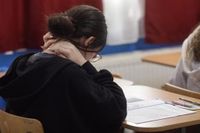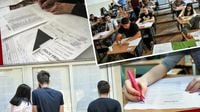On March 24, 2025, students in the 12th and 13th grades across Romania took part in the simulation for the Baccalaureate exam, specifically focusing on the Romanian Language and Literature. This year, the examination materials were based on a passage from Stefan Augustin Doinaș’s volume "Evocări", highlighting the figure of Liviu Rusu, a notable professor from the University of "Regele Ferdinand" in Sibiu.
Over 123,000 high school students participated, spread across 1,318 exam centers, reflective of the reach and importance of these evaluations. Notably, the subjects varied for different profiles, including real science, technology, and vocational pathways, excluding the pedagogical profile. The educational authorities had prepared topics akin to previous years to provide students with a structured challenge.
For Subject I A, students were prompted to explain various words and expressions from the text, identify the city where "Regele Ferdinand" University operated during wartime, and address additional questions each rated at six points. One part of this section required students to draft a mini-text of 30–50 words discussing how symphonic music influences the author.
Subject I B focused on assembling a 150–300 word argumentative composition addressing whether teachers enhance the cultural experiences of youth, allowing students to draw from both the text provided and their personal insights.
The second subject challenged students to comment on the poem "Iarna" by Adrian Maniu, requiring a minimum of 50 words while highlighting the relationship between the poetic idea and artistic means—this section could earn students up to 20 points.
As has been customary, the final subject encompassed writing an essay, with a minimum requirement of 400 words to reflect on the characteristics of a psychological novel or a studied personal experience.
Results from this simulation are set to be shared with students on April 8, 2025, with evaluations being conducted digitally via platforms established by the Ministry of Education. Notably, evaluations from practice exams will not be included in the official academic records unless requests are made in writing by the students or their parents.
The method employed is aimed at enhancing transparency and accountability in the evaluation process, as authorities are keen on improving overall educational standards. The simulations serve as a preparatory tool leading into the final examinations scheduled for June 10-16, 2025, marking a significant moment in these students' academic careers.
Closure of the academic year for grades 12 and 13 will occur on June 6, 2025, giving students time to focus on final preparations before official assessments begin.
In this context, the Minister of Education noted the importance of adapting teaching methodologies based on feedback from exam simulations. "The objective is to implement measures that improve educational outcomes, particularly as we approach the final examinations in June and July 2025," the minister stated, emphasizing proactive schooling practices.
The framework established for this year's simulation aims not merely at gauging knowledge but also at encouraging students to reflect critically on their learning, thereby elevating their engagement with the educational process.
In light of results from prior years, the focus is also on enhancing students' comfort levels in academic settings. In 2024, the pass rate for the Romanian language was noted to be 60.13%, indicating room for improvement. Strategies may shift to ensure that currently enrolled students are equipped adequately to succeed come the official assessments later in the year.
Overall, the simulation marks a pivotal learning point, encouraging students to embrace challenges while providing educators with a structured means to gauge student comprehension, readiness, and areas that might require additional support.






